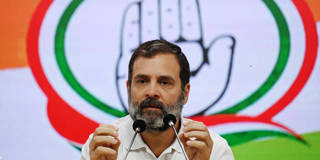The sentencing of Rahul Gandhi, who leads the opposition Indian National Congress, to two years in prison over a 2019 quip may turn out to be a political own-goal by the ruling Bharatiya Janata Party. But the episode's implications for the future of India's democracy should not be underestimated.
NEW DELHI – The sentencing of Rahul Gandhi, the leader of the opposition Indian National Congress, to two years in prison, and his disqualification as a lawmaker in the Lok Sabha (the lower house), has sent shockwaves through India’s political system. Beyond reverberating through both houses of parliament, the episode has opened a new and sorry chapter in India’s political history – and cast serious doubt on the future of its democracy.

NEW DELHI – The sentencing of Rahul Gandhi, the leader of the opposition Indian National Congress, to two years in prison, and his disqualification as a lawmaker in the Lok Sabha (the lower house), has sent shockwaves through India’s political system. Beyond reverberating through both houses of parliament, the episode has opened a new and sorry chapter in India’s political history – and cast serious doubt on the future of its democracy.